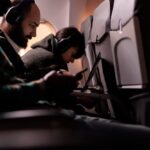Brussels Airlines announced its move to apply Virtual Reality (VR) as part of the training for pilots. It is the first to implement VR technology for pilot training without an instructor, pioneering the tech within the Lufthansa Group. The software was developed through a partnership between the Lifthansa Group and Airbus.

Breakthrough in pilot training
Two crews from Brussels Airlines completed a part of their A320 Type Rating from Jul 2 to 4 using a VR-based solution within an authority-approved training program.
It led the airline to become the launch customer, to incorporate breaking Virtual Procedure Training (VPT), which was developed by Airbus, into pilot training.
It is the first time that VR technology is used as a replacement for traditional training devices such as Flat Panel Trainer, which need supervision by an instructor, instead of a supplement.

About the technology and further development
The implementation of VR training is the result of more than two years of collaboration between Lufthansa Aviation Training and Airbus.
The breaking technology usage could also be represented as a technological turning point, which is using VR technology to elevate the conventional “screen-based cockpit” training, to provide a fully immersive and realistic 3D environment interaction and guidance to a different level.
Following the step led by Brussels Airlines, the Lufthansa Group is expected to introduce it at all ten A320 operators within the Lufthansa Group across seven training locations.
Parallelly, the VPT will be used to train normal standard operating procedures, and being optimised and developed constantly, to further support abnormal procedures and additional aircraft types such as the A330 and A350.
Lufthansa Aviation Training is also preparing to adapt the product for the external training market.
Lufthansa Aviation Training Project Manager Pia Born said:
“With the VPT we are creating a new training ecosystem: more flexible, more efficient, and sustainable. We are very pleased that Brussels Airlines is the first to trust in this innovation – and that we were able to shape a piece of the future of training together.”
Brussels Airlines Chief Theoretical Knowledge Instructor (CTKI) Captain Gauthier Lesceu said:
“VR offers a significantly more realistic and intense training experience. Our pilots can autodidactically practice procedures early and repeatedly, build muscle memory, and gain situational confidence – an ideal preparation for the simulator phase with increased effectiveness and reduced infrastructure requirements.”
How do you think about applying VR to pilot training? Are you excited to fly with the pilot who experienced VR training in the sky one day? Leave a comment below!









